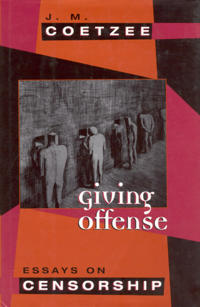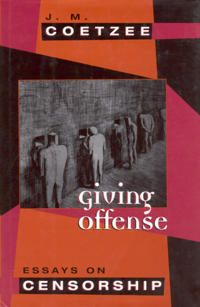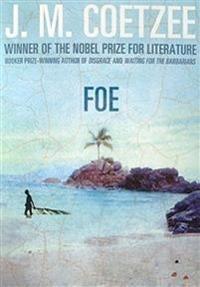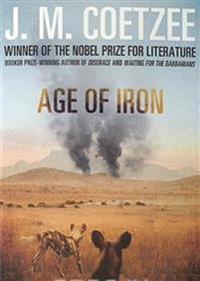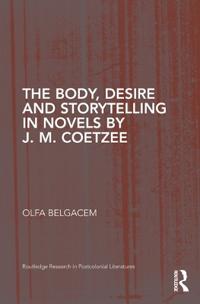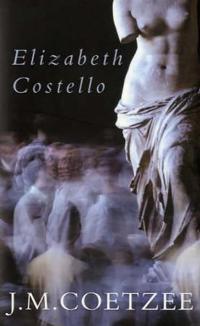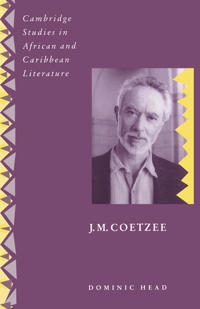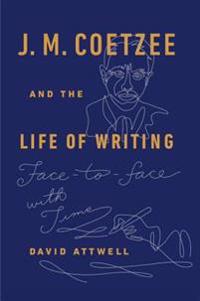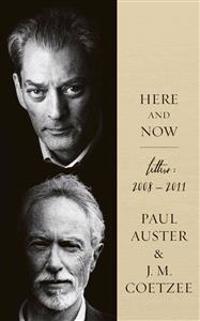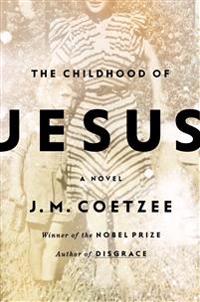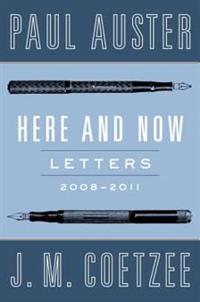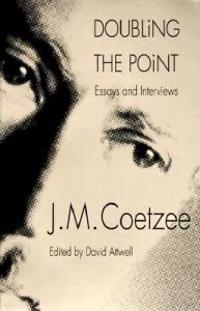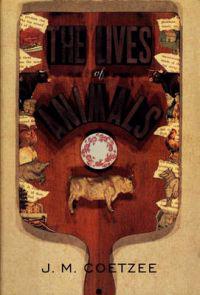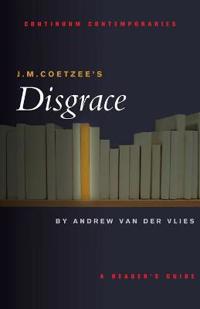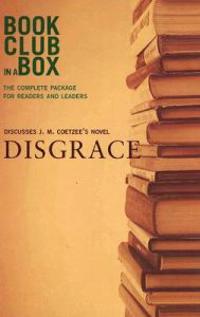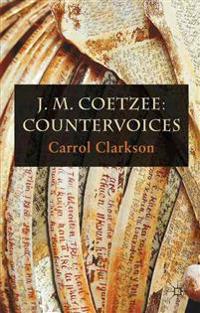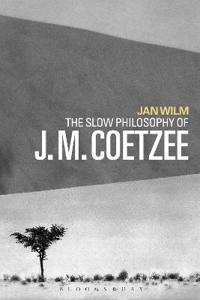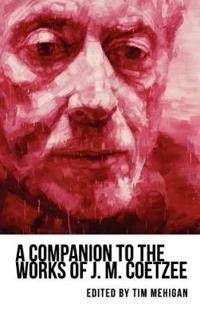Giving Offense (Inbunden)
avJ. M. Coetzee
ISBN: 9780226111742 - UTGIVEN: 1996-04This text presents an analysis of censorship from the perspective of a writer who has lived and worked under its shadow. The essays collected here attempt to understand the passion that plays itself out in acts of silencing and censoring. Subscribing neither to the myth of the writer as a moral gian[...]
Giving Offense (Häftad)
avJ. M. Coetzee
ISBN: 9780226111766 - UTGIVEN: 199712This is an analysis of censorship from the perspective of one who has lived and worked under its shadow. The essays collected here attempt to understand the passion that plays itself out in acts of silencing and censoring. Coetzee argues that a destructive dynamic of belligerence and escalation tend[...]
J. M. Coetzee and Ethics (Häftad)
ISBN: 9780231148412 - UTGIVEN: 201005In 2003, South African writer J. M. Coetzee was awarded the Nobel Prize in Literature for his riveting portrayals of racial repression, sexual politics, the guises of reason, and the hypocrisy of human beings toward animals and nature. Coetzee was credited with being "a scrupulous doubter, ruthless [...]
Foe (Häftad)
avJ. M. Coetzee
ISBN: 9780241950111 - UTGIVEN: 201008Nobel Laureate and two-time Booker prize-winning author of "Disgrace" and "The Life and Times of Michael K", J. M. Coetzee reimagines Daniel DeFoe's classic novel "Robinson Crusoe in Foe". In an act of breathtaking imagination, J.M Coetzee radically reinvents the story of Robinson Crusoe. In the ear[...]
Age of Iron (Häftad)
avJ. M. Coetzee
ISBN: 9780241951019 - UTGIVEN: 201008Nobel Laureate and two-time Booker prize-winning author of "Disgrace" and "The Life and Times of Michael K", J. M. Coetzee tells the remarkable story of a nation gripped in brutal apartheid in his "Sunday Express" Book of the Year award-winner "Age of Iron". In Cape Town, South Africa, an elderly cl[...]
Cripplewood / Kreupelhout: 55th International Art Exhibition: The Venice Biennale (Inbunden)
avJ. M. Coetzee, Berlinde De Bruyckere, Herman Parret
ISBN: 9780300196573 - UTGIVEN: 2013-08-02The Body, Desire and Storytelling in Novels by J. M. Coetzee
ISBN: 9780367002343 - UTGIVEN: 2018-10Asserting that Coetzee's representation of the body as subject to dismemberment counters the colonial representation of the other's body as exotic and erotically-charged, this study inspects the ambivalence pertaining to Coetzee's embodied representation of the other and reveals the risks that come [...]
Elizabeth Costello (Inbunden)
avJ. M. Coetzee
ISBN: 9780436206160 - UTGIVEN: 200309Elizabeth Costello is an Australian writer of international renown; she is f-ted, studied, honoured. Famous principally for an early novel that established her reputation and from which, it seems, she will never escape, she has reached the stage, late in life, where her remaining function is to be v[...]
J.M.Coetzee (Häftad)
ISBN: 9780520078123 - UTGIVEN: 1993-06David Attwell defends the literary and political integrity of South African novelist J.M. Coetzee by arguing that Coetzee has absorbed the textual turn of postmodern culture while still addressing the ethical tensions of the South African crisis. As a form of "situational metafiction," Coetzee's wri[...]
J. M. Coetzee (Häftad)
avDominic Head
ISBN: 9780521484237 - UTGIVEN: 201008The importance of J. M. Coetzee in the development of twentieth-century fiction is widely recognised. His work addresses some of the key issues of the late twentieth and early twenty-first centuries: the relationship between postmodernism and postcolonialism, the role of history in the novel, and th[...]
The Cambridge Introduction To J. M. Coetzee (Pocket)
avDominic Head
ISBN: 9780521687096 - UTGIVEN: 2009-03-26An overview for students and readers of the work, career and international context of the author of Disgrace.[...]
J. M. Coetzee and the Life of Writing: Face-To-Face with Time
ISBN: 9780525429616 - UTGIVEN: 2015-09A moving, insightful biography of the Nobel Laureate and a study of J. M. Coetzee s work, illuminating the creation of his exceptional novels
J. M. Coetzee is one of the world s most intriguing authors. Compelling, razor-sharp, erudite: the adjectives pile up but the heart of the fiction remains[...]Here and Now (Inbunden)
avPaul Auster, J. M. Coetzee
ISBN: 9780571299263 - UTGIVEN: 201305Although Paul Auster and J.M. Coetzee had been reading each other's books for years, the two writers did not meet until February 2008. Not long after, Auster received a letter from Coetzee, suggesting they begin exchanging letters on a regular basis and, "God willing, strike sparks off each other". [...]
The Childhood of Jesus (Inbunden)
avJ. M. Coetzee
ISBN: 9780670014651 - UTGIVEN: 2013-09A major new novel from the Nobel Prize-winning author of "Waiting for the Barbarians," "The Life & Times of Michael K" and "Disgrace"
Nobel laureate and two-time Booker Prize winner J. M. Coetzee returns with a haunting and surprising novel about childhood and destiny that is sure to rank with [...]Here and Now: Letters 2008-2011 (Inbunden)
avPaul Auster, J. M. Coetzee
ISBN: 9780670026661 - UTGIVEN: 201303The high-spirited correspondence between "New York Times" bestselling author Paul Auster and Nobel laureate J. M. Coetzee
Although Paul Auster and J. M. Coetzee had been reading each other's books for years, the two writers did not meet until February 2008. Not long after, Auster received a let[...]Doubling the Point (Häftad)
avJ. M. Coetzee, David Attwell
ISBN: 9780674215184 - UTGIVEN: 199209Nadine Gordimer has written of J.M. Coetzee that his "vision goes to the nerve-centre of being. What he finds there is more than most people will ever know about themselves, and he conveys it with a brilliant writer's mastery of tension and elegance". "Doubling the Point" takes the reader to the cen[...]
The Lives of Animals (Häftad)
avJ. M. Coetzee
ISBN: 9780691070896 - UTGIVEN: 200104The idea of human cruelty to animals so consumes novelist Elizabeth Costello in her later years that she can no longer look another person in the eye: humans, especially meat-eating ones, seem to her to be conspirators in a crime of stupefying magnitude taking place on farms and in slaughterhouses, [...]
J. M. Coetzee's Disgrace (Häftad)
avAndrew Van der Vlies
ISBN: 9780826406613 - UTGIVEN: 201003This book presents a clearly written introduction to the novel's themes and form, inspired by the author's practical experience of several years of teaching the novel at university level in Britain, as well as his background as a South African-born and educated academic. One of the most widely read [...]
"Bookclub-in-a-Box" Discusses the Novel "Disgrace" (Häftad)
avJ. M. Coetzee
ISBN: 9780973398458 - UTGIVEN: 200511This is a terrific resource for students and educators of literary fiction. The newer novels of our time have few supportive interpretations as of yet; the classics have too many. BOOKCLUB-IN-A-BOX is the spot to come for a literary perspective and understanding that is just right. If you have suffe[...]
J. M. Coetzee: Countervoices (Häftad)
avCarrol Clarkson
ISBN: 9781137357335 - UTGIVEN: 2013-09This book, now in paperback for the first time and with a new preface, pays sustained attention to the dynamic interaction between Coetzee's fiction and his critical writing, exploring the Nobel prize-winner's participation in, and contribution to, contemporary literary-philosophical debates. It con[...]
J. M. Coetzee: Countervoices (häftad)
ISBN: 9781349307074 - UTGIVEN: 2014-01Clarkson pays sustained attention to the dynamic interaction between Coetzee's fiction and his critical writing, exploring the Nobel prize-winner's participation in, and contribution to, contemporary literary-philosophical debates. The book engages with the most recent literary and philosophical res[...]
The Slow Philosophy of J. M. Coetzee (häftad)
ISBN: 9781350056299 - UTGIVEN: 2017-12In The Slow Philosophy of J.M. Coetzee Jan Wilm analyses Coetzee's singular aesthetic style which, he argues, provokes the reader to read his works slowly. The effected `slow reading' is developed into a method specifically geared to analyzing Coetzee's singular oeuvre, and it is shown that his work[...]
The Slow Philosophy of J. M. Coetzee
ISBN: 9781474256452 - UTGIVEN: 2016-06In The Slow Philosophy of J.M. Coetzee Jan Wilm analyses Coetzee's singular aesthetic style which, he argues, provokes the reader to read his works slowly. The effected 'slow reading' is developed into a method specifically geared to analyzing Coetzee's singular oeuvre, and it is shown that his work[...]
J. M. Coetzee?s the Childhood of Jesus
ISBN: 9781501318627 - UTGIVEN: 2017-02Since the controversy and acclaim that surrounded the publication of Disgrace (1999), the awarding of the Nobel Prize for literature and the publication of Elizabeth Costello: Eight Lessons (both in 2003), J. M. Coetzee's status has begun to steadily rise to the point where he has now outgrown the s[...]
A Companion to the Works of J. M. Coetzee (Inbunden)
avTim Mehigan
ISBN: 9781571135070 - UTGIVEN: 201112J. M. Coetzee is perhaps the most critically acclaimed bestselling author of imaginative fiction writing in English today. He received the Nobel Prize for Literature in 2003 and is the first writer to have been awarded two Booker Prizes. The present volume makes critical views of this important writ[...]

